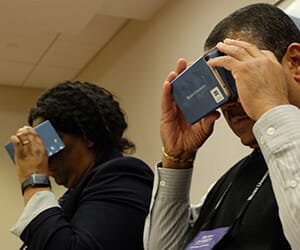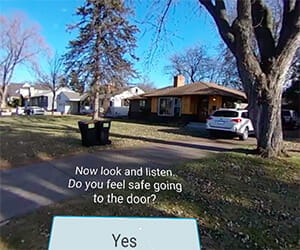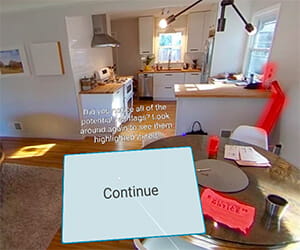
Walden’s first VR pilot for students simulates the difficult scenarios social workers might encounter in the field. The pilot allows for students to learn in a safe, yet realistic environment, as these situations can be challenging for even highly-trained social workers.
“One of the most attractive components of VR is knowing that our students can experience simulations of real-life work scenarios without having to travel somewhere,” says Steve Tom, Walden's chief strategy and transformation officer. “VR also allows for our students to explore and learn various methods for handling difficult social work scenarios without putting them or those they are trying to help in harm’s way.”
For the VR pilot, Walden chose to build the experience on Daydream, Google's platform for mobile VR. They then brought the content to Cardboard VR headsets to make it even more accessible to all their students.
“With this pilot, we wanted to prove that VR can not only be integrated into the student learning experience effectively, but that it’s also worth the investment,” says Tom. “Google’s hardware fit our needs perfectly, especially in making the technology as easy and highly intuitive as possible for our students. It requires very little training and setup, allowing for our students to use the technology within minutes.”
 Giving social work students a head start
Giving social work students a head start
Walden’s Innovation Incubator didn’t just want a video game-like experience — they wanted to simulate life-like situations that students might encounter in the field.
“We wanted it to feel as authentic as possible, so we focused on creating different types of environments a social worker might face,” says Tom. “This includes various settings in the social work field that can be frenetic and even upsetting. It was important to our social work faculty to be able to use this tool to help Walden students develop instincts for heat-of-the-moment encounters during home visits. The more we prepare our students for the most stressful situations, the better our students will be able to help those in need.”
For the pilot, Walden trained more than 500 students who had gathered for a three-day residency in Atlanta, Georgia. To prepare, the team built the training program using Unity. In addition to visual experiences, the Walden team inserted audible cues to enhance the VR learning experience.
“Audible cues, such as loud barking coming from behind a door, can send a signal for our social work students to be careful,” explains Tom. “The goal is to help students recognize key visual and audio signals and react accordingly. When they overhear a specific sound or come across concerning signals and cues while scanning a room, it adds to their social work learning experience.”
Walden’s students were deeply engaged within minutes of starting the first VR training session, which was delivered via Daydream View and Cardboard headsets using Android phones. The Walden team quickly knew they were on to something.
“We were really astounded by the results,” says Tom. “In the survey, 100% of the 188 respondents said the VR training helped them gain valuable insight into what to expect during an on-site visit. All the respondents also said they wanted access to more VR experiences for social work and other courses.”
 Scaling for the future
Scaling for the future
Based on the pilot’s success, the VR content is being further incorporated into the social work curriculum — and other programs at the university are exploring similar VR deployments. Although Tom acknowledges he can’t predict the future of educational VR, he’s excited and proud of this initiative. His team is already developing additional VR experiences using Tour Creator.
“We believe in this technology,” shares Tom. “VR can help prepare students for instinctive situations where they can practice their skills in a safe environment. It helps them build muscle memory before they enter the field. As VR becomes more mainstream, students will come to expect it from their learning institutions. For us at Walden, VR is as much about creating compelling experiences for our students as it is staying ahead of the game to meet their needs.”
Read Google’s case study on Walden University’s use of virtual reality.
About Walden University
For more than 45 years, Walden University has supported working professionals in achieving their academic goals and making a greater impact in their professions and communities. Students from the District of Columbia, all 50 states in the U.S. and more than 150 countries are pursuing their bachelor’s, master’s or doctoral degrees online at Walden. The university offers more than 80 degree programs with over 385 specializations and concentrations. Walden University is accredited by The Higher Learning Commission, hlcommission.org. It is also one of more than 70 institutions in 25 countries that make up the Laureate International Universities network. For more information about Walden, visit WaldenU.edu.



